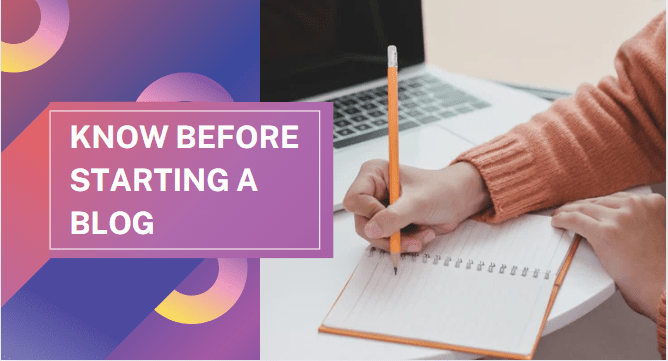There are many important things you should know before starting your own site to make your blogging journey easier and achieve quick success. To become successful, you need to be patient with blogging and continuously upgrade your knowledge to improve your site’s ranking.
On social media and the internet, some people spread misinformation just to get more views, which can mislead beginners into believing in unrealistic earnings from blogging. Here is a genuine guide with important information that beginners should know.
Why Blogging Is A Popular Choice
Blogging is a popular choice, with over 600 million blogs created in 2024 and a huge number of posts uploaded daily. These numbers show just how popular blogging is becoming.
Blogging offers the freedom to work on your own terms, with no earnings cap, the choice to write about topics you love, and the ability to work from anywhere in the world with just a device and an internet connection. These advantages are rare in most other businesses.
Ways People Make Money from Blogging:

- PPC Ads
- Affiliate Marketing
- Sponsorships
- E-commerce Sales
- Sponsored Posts
These five are the most common ways bloggers earn money, and each is discussed below.
Important Factors a Beginner Must Know to Become Successful in Blogging
Knowledge of blogging can help you avoid common beginner mistakes, as each error on a site can be difficult to correct and can negatively impact your page’s ranking. Many beginners make similar mistakes due to a lack of knowledge about search engine optimization (SEO), which can slow down their potential for success.
1. Define Your Blogging Purpose to Stay Focused
Many bloggers skip creating a roadmap for their blog strategy and purpose, which leads to posting irrelevant content without clarity on their goals. Simply creating content and posting without a strategy won’t lead to success.
Here are a few points to help you choose your blog’s goal:
Blogging goals should depend on your mindset, expectations, and situation. For example
- If you have an offline business, you can grow it through blogging.
- You could develop it as a source of lifetime passive income.
- You might gather an audience to start an online business.
Choosing a blogging niche is directly connected to your goal.
2. Choose the Right Blogging Platform
Beginners sometimes make two mistakes when choosing a blogging platform:
- Choosing a free platform (e.g., Blogger) because they’re unaware of its limitations.
- Purchasing a domain and hosting without a proper plan or knowledge of search engine optimization (SEO).
Read: The Best Blogging Platform to Start With.
Free platforms come with many limitations. To get full access to SEO features for your site, we always suggest starting with WordPress. Here’s why:
- No coding knowledge is needed; you can accomplish a lot by installing plugins, which free platforms don’t offer.
- WordPress provides extensive customization options to make your blog look professional, helping increase engagement rates.
- You can create custom SEO-friendly URLs.
- You can edit the “no-index” robots.txt to prevent low-content pages (e.g., tag pages, category pages) from being crawled, which helps improve your site’s SEO.
- SEO plugins allow for real-time content optimization and keyword targeting, enhancing the quality of your writing—features missing from free platforms.
- Links with free domains are often unsupported on some platforms offered by free hosting providers.
First, plan your niche and category, and create a one-month content calendar for posting. After that, you’re ready to start your blog!
3. Design a User-Friendly and SEO-Optimized Blog Layout
Before creating a blog, it’s essential to know how to design a user-friendly blog layout that meets SEO standards. Planning the layout in advance will help you select the best theme and customize it efficiently, without confusion.
We recommend researching the best and most popular themes to install. This will help you avoid choosing themes with issues like poor font choices, improper image sizing, or slow loading times.
Here are a few points to plan before starting theme customization:
- Categories and Subcategories: Decide how many categories and subcategories you’ll create and determine which category you’ll start writing for.
- Homepage Design: Plan how you want your homepage to look, as many new bloggers overlook this. A well-designed homepage is essential for a professional site.
- Keyword Research and Content Ideas: Conduct keyword research and come up with 15-30 content ideas within your chosen categories. This will help you create content faster.
- Initial Content Creation: Write 15-30 posts before launching your website. Rapid content publishing is crucial for new sites to grow, and it also enhances your content writing skills.
4. Know Important Guidelines to Keep Your Site Safe
Knowing the important guidelines is crucial when planning your blog’s content ideas, niche, and layout. If you unknowingly break Google’s guidelines, it can lead to many issues:
- AdSense Approval: AdSense will not approve sites that don’t follow Google’s guidelines.
- SEO Impact: Violating guidelines can negatively impact your site’s SEO, leading to lower rankings and reduced traffic.
- Site Ban: Google may ban your site entirely.
Having the right knowledge is essential to keep your website trouble-free.
5. Prepare Your Mindset to Stay Motivated
Getting traffic to a blog takes time and effort. You need to be prepared to face periods of low traffic and to have a mindset focused on continuously improving your content. Success depends not only on content quality but also on factors like niche selection, content titles, and various SEO elements.
6. Know How to Proofread Content
It’s normal to make mistakes in spelling or sentence structure. You need to review content carefully before publishing it online, as Google’s bots can detect errors when crawling your site, and visitors may form a negative impression of your site.
Manual proofreading can be time-consuming, so you can use these popular tools to help you proofread quickly and accurately:
- Grammarly
- Small SEO Tools
Familiarizing yourself with these tools when planning your blog will help you create error-free content more efficiently.
7. Never Delete Content That’s Already Indexed Without Proper Knowledge
New bloggers sometimes delete content they consider low quality or unnecessary without realizing how negatively this can impact their site’s ranking.
When a blog post is indexed on Google, deleting it from your site will still leave it visible in search results. If a user clicks on the link, it will lead to a “404 Page Not Found” error. To avoid traffic loss and 404 errors, it’s better to redirect the URL to another relevant page.
Another solution is to remove the URL from Google by submitting the page link in Google Search Console. This will temporarily remove the link from search results.
8. Earning Money from Ads Directly Depends on the Topic You Choose
Before choosing a blog niche, you should know how much revenue potential each niche has. Sometimes, bloggers select a niche with low earning potential while hoping to make a substantial income. You can choose any niche you like, but it’s essential to have realistic expectations for earnings from AdSense or other ad networks.
Your earnings will also depend on your audience. International blogging tends to have higher earning potential and more opportunities for growth than local blogging.
There are no fixed rules on how much you can earn from a particular niche. Success depends entirely on your future planning and strategy for the blog.
